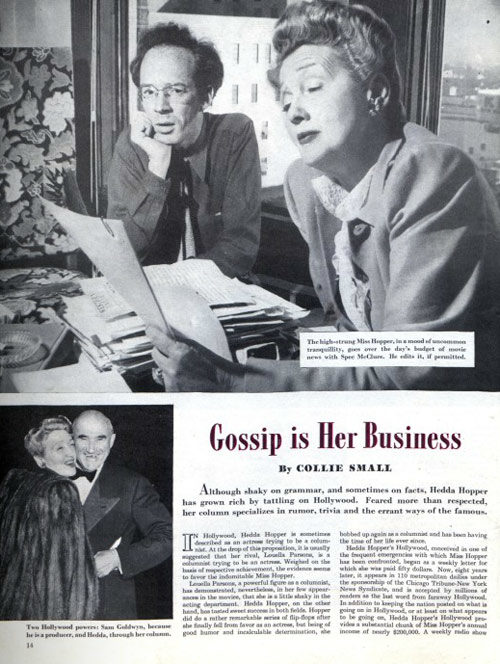The Career that Fear Built: Hedda Hopper Ruled the Gossip Business
On National Gossip Day, we look at one of the most notorious Hollywood gossips, Hedda Hopper. You wouldn’t know it from this 1947 profile of Hopper, “Gossip Is Her Business,” but her business involved a lot more than just gossip.
Hopper was a formidable power in Hollywood for 27 years. Through her highly popular column, she could ruin stars’ careers and kill movies she didn’t like. Beyond critiquing actors’ performances, she would dissect their private lives, holding up their affairs, marriages, politics, or sexual orientation to criticism. She showed a special disregard for blacks, gays, and Democrats.
She could as easily make a career as end one, however. She revived the sagging career of Joan Crawford in the 1940s and might have helped her win an Oscar.
Movie stars found her helpful, so long as they gave her first notice of their weddings, pregnancies, or career moves. Those who didn’t notify Hedda before the rest of the world were dealt with harshly. One star, for example, announced her pregnancy to Hopper and rival columnist Louella Parsons at the same time. Hopper retaliated by never mentioning her name again (which is why you have probably never heard of Joan Evans).
Readers took her opinions seriously. Ingrid Bergman told Hopper she was not pregnant from an adulterous liaison with a film director. She then told Louella Parsons that she was, in fact, expecting. Furious at being deceived and not getting the scoop, Hopper got her revenge through scathing criticism of Bergman, whom she had formerly promoted. Her outrage was so inspiring that Bergman was denounced on the floor of the Senate as “a horrible example of womanhood,” and a “powerful influence for evil.”
Hopper also cooperated with the red-baiting purge of communist sympathizers in Hollywood. She suspected several stars, writers, and studio executives of communist leanings, and she gave these names to Congressional investigators, helping to destroy even more careers.
Most stars avoided her unless they had some news to offer. Some stars were grateful to Hedda because she was a source of priceless publicity for them. Others simply played along with her, avoiding her wrath. And others acted out their anger over what she wrote about them. Joan Bennett sent her a skunk on Valentine’s Day. Spencer Tracy publicly kicked her backside for gossiping about him and Katherine Hepburn. Joseph Cotton pulled her chair out from under her as she was sitting down at a fancy ball. The other guests, many of whom had been Hopper’s victims, toasted him with champagne. The next morning, he received dozens of floral bouquets from others in the entertainment business who lacked his nerve.
They might have despised her, but they read her, along with the 35 million Americans across the country who followed her column. Bob Hope said of Hopper’s and Parsons’ columns, ““They were the first thing we looked at every morning.”
Hopper knew she how damaging her column could be, and she knew what many thought of her. But she reveled in the reputation. She called herself “the bitch of the world,” and referred to her Beverly Hills mansion as “the house that fear built.”
Her death in 1966 marked the end of what many call the “golden age of Hollywood.” But it also marked the end of an era when one woman had so much power —for good and bad — in the industry.
